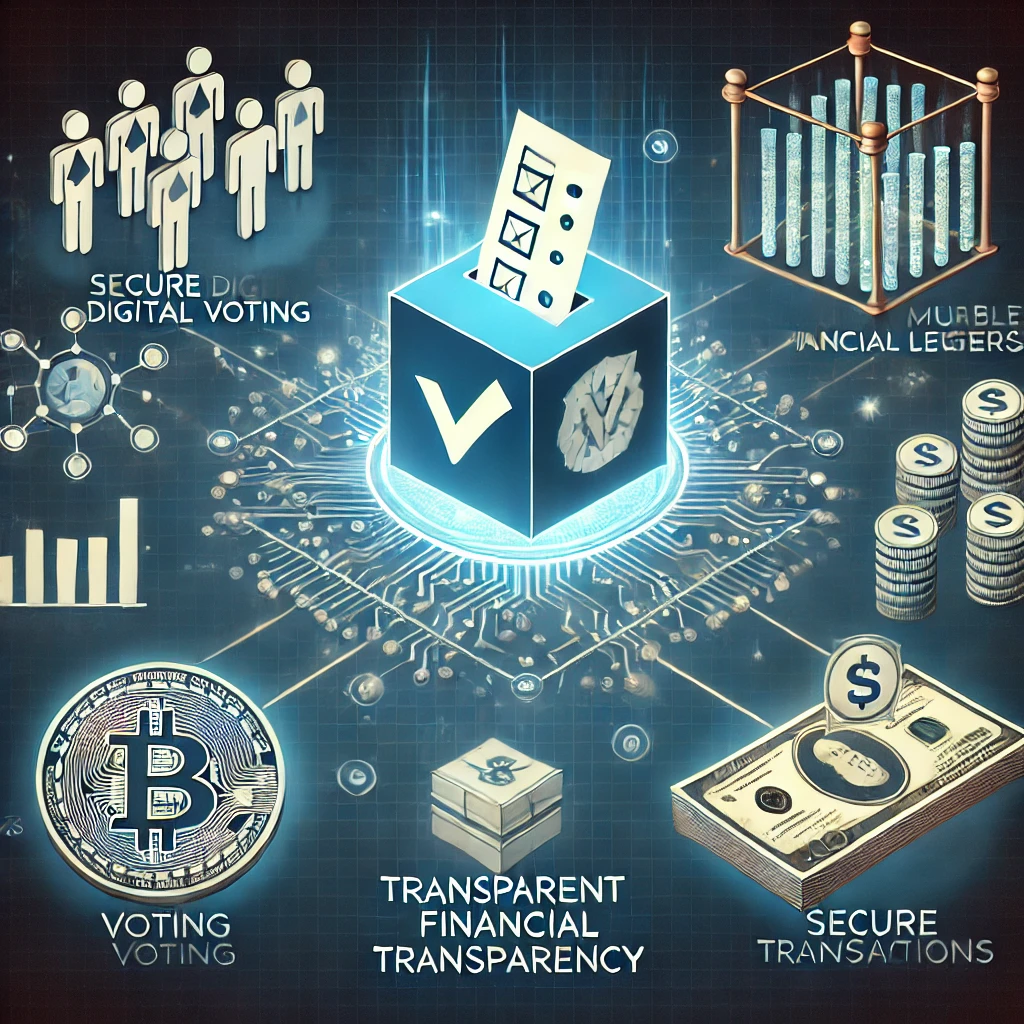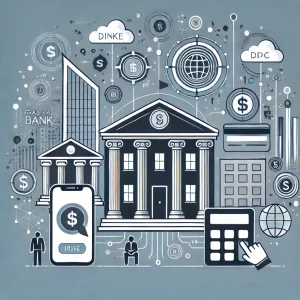How Blockchain is Transforming Voting and Financial Transparency

Blockchain technology, best known for its use in cryptocurrencies like Bitcoin, is having a profound impact on various industries beyond finance. One of the most promising applications of blockchain is its potential to transform voting systems and improve financial transparency. By providing a decentralized, immutable, and transparent ledger system, blockchain offers solutions to many of the challenges that have long plagued these areas, such as voter fraud, data manipulation, and lack of accountability.
In this article, we will explore how blockchain is revolutionizing voting systems and enhancing financial transparency, the key benefits of adopting this technology, and the challenges that need to be addressed for its widespread implementation.
Blockchain in Voting: A New Era of Electoral Integrity
Traditional voting systems, whether paper-based or electronic, are vulnerable to fraud, corruption, and inefficiencies. Issues such as voter identity verification, tampering with ballots, and low voter turnout have raised concerns about the integrity of elections worldwide. Blockchain technology offers a potential solution to these problems by providing a secure, transparent, and tamper-proof system for conducting elections.
1. Enhanced Security and Transparency
One of the main advantages of using blockchain in voting is its ability to ensure the security and transparency of the voting process. Blockchain creates an immutable ledger that records each vote as a block in the chain. Once a vote is cast and added to the blockchain, it cannot be altered or deleted, preventing any form of tampering or manipulation. This level of security ensures that all votes are counted accurately and that election results reflect the true will of the voters.
Moreover, blockchain allows for full transparency in the voting process. Every vote is recorded on a public ledger that can be audited by independent parties. This not only increases public trust in the electoral system but also deters attempts at fraud by making it easier to identify any irregularities.
2. Voter Identity Verification
A significant challenge in many voting systems is verifying voter identity while maintaining voter anonymity. Blockchain can help solve this problem by enabling secure and verifiable digital identities. Voters can register on a blockchain-based voting platform using a cryptographic key that verifies their identity. Once their identity is verified, they can vote without revealing their personal information, ensuring both security and privacy.
Blockchain-based identity verification systems reduce the risk of fraudulent votes, such as people voting multiple times or non-eligible individuals participating in elections. At the same time, the system can ensure that each voter’s identity remains anonymous, preserving the confidentiality of the voting process.
3. Improving Voter Accessibility
One of the main reasons for low voter turnout is the inconvenience of traditional voting methods, which often require voters to travel to polling stations or submit absentee ballots. Blockchain-based voting systems can make the process more accessible by allowing voters to cast their ballots from anywhere in the world using a smartphone or computer.
This increased accessibility can lead to higher voter participation rates, especially among populations that face barriers to traditional voting, such as people living in remote areas, overseas citizens, or individuals with disabilities. By making voting more convenient, blockchain can help ensure that more voices are heard in the democratic process.
4. Real-Time and Accurate Election Results
Blockchain technology can also improve the speed and accuracy of election results. In traditional voting systems, it often takes days or even weeks to tally votes and announce official results. Blockchain-based voting systems can automate the vote-counting process, providing real-time updates as votes are cast and ensuring that election results are available almost immediately after the polls close.
Additionally, because blockchain records every vote in a tamper-proof ledger, there is no need for recounts or manual verifications, reducing the risk of errors and disputes over the final outcome.
Blockchain and Financial Transparency: Revolutionizing Accountability
Financial transparency is crucial for maintaining trust in public institutions, private organizations, and global financial systems. However, financial fraud, corruption, and lack of accountability have long been significant challenges. Blockchain offers a promising solution by providing a transparent and immutable record of financial transactions that can be audited and verified by all parties involved.
1. Immutable and Transparent Financial Records
At its core, blockchain is a distributed ledger that allows multiple parties to record and share information without needing a central authority. This decentralized nature ensures that financial records are transparent, immutable, and accessible to all stakeholders.
In a blockchain-based financial system, every transaction is recorded as a block in the chain, and each block is linked to the one before it. Once a transaction is added to the blockchain, it cannot be altered or deleted, providing a permanent record of all financial activities. This level of transparency makes it difficult for bad actors to manipulate financial data or engage in fraudulent activities without being detected.
For example, in public finance, blockchain can be used to track government spending, ensuring that funds are used as intended and reducing the risk of embezzlement or misappropriation. In private organizations, blockchain can improve accountability by providing real-time visibility into financial transactions, reducing the risk of accounting fraud or hidden debts.
2. Auditable Financial Systems
One of the key advantages of blockchain is its ability to provide an auditable trail of financial transactions. Traditional financial audits are often time-consuming and expensive, requiring auditors to manually verify records and trace the flow of funds. With blockchain, auditors can easily access a transparent and immutable record of transactions, making the auditing process more efficient and reliable.
This capability is particularly beneficial in industries where regulatory compliance is critical, such as banking, insurance, and healthcare. By providing real-time audit trails, blockchain can help organizations meet regulatory requirements and avoid costly fines or legal disputes.
3. Reducing Corruption and Fraud
Blockchain has the potential to significantly reduce corruption and fraud in financial systems by increasing transparency and accountability. In many countries, government funds are often misused or siphoned off by corrupt officials, leading to economic instability and public distrust. Blockchain can provide a clear and traceable record of how public funds are allocated and spent, making it easier to identify and prevent corrupt practices.
Similarly, in corporate finance, blockchain can reduce the risk of insider trading, money laundering, and other financial crimes by ensuring that all transactions are recorded and verifiable. The transparency of blockchain makes it difficult for individuals or organizations to hide illicit activities, promoting a higher level of trust and integrity in financial markets.
4. Enhancing Supply Chain Transparency
In addition to improving financial transparency, blockchain is also transforming supply chain management by providing greater visibility into the movement of goods and finances across the supply chain. With blockchain, companies can track the origin, movement, and payment for goods in real-time, ensuring that products are sourced ethically, and payments are made transparently.
For example, in the food industry, blockchain can be used to trace the journey of agricultural products from farm to table, ensuring that consumers receive safe and ethically sourced food. Similarly, in manufacturing, blockchain can provide transparency into the sourcing of raw materials, reducing the risk of counterfeit goods and ensuring that suppliers are paid fairly.
Challenges of Blockchain Adoption
While blockchain offers significant benefits for both voting systems and financial transparency, there are also challenges that need to be addressed for its widespread adoption.
1. Scalability
One of the main challenges of blockchain technology is scalability. As more transactions are added to a blockchain, the system can become slower and less efficient. For large-scale applications, such as national elections or global financial systems, blockchain platforms must be able to handle a high volume of transactions without compromising speed or security.
2. Regulatory and Legal Barriers
The regulatory landscape surrounding blockchain is still evolving, and there is uncertainty about how blockchain-based systems will be governed. In some countries, there are legal barriers to adopting blockchain for voting or financial transparency, and governments may be hesitant to implement such systems without clear regulatory frameworks in place.
3. Privacy Concerns
While blockchain provides transparency, it also raises concerns about privacy. In voting systems, for example, ensuring voter anonymity while maintaining transparency is a delicate balance. Similarly, in financial systems, there is a need to protect sensitive financial information while ensuring that transactions are transparent and auditable.
4. Adoption and Integration
Adopting blockchain technology requires significant changes to existing systems and infrastructure. Governments, businesses, and institutions must invest in new technologies, train staff, and ensure that blockchain platforms can be integrated with existing systems. This process can be costly and time-consuming, which may slow down the adoption of blockchain-based solutions.
Conclusion
Blockchain technology is poised to transform both voting systems and financial transparency, offering solutions to long-standing challenges such as voter fraud, corruption, and lack of accountability. By providing a secure, transparent, and immutable ledger system, blockchain can enhance the integrity of elections, improve the accuracy of financial records, and reduce the risk of fraud and corruption in both public and private sectors.
While challenges such as scalability, regulatory hurdles, and privacy concerns remain, the potential benefits of blockchain far outweigh the obstacles. As the technology continues to evolve, we can expect to see more widespread adoption of blockchain-based solutions, paving the way for a more transparent and trustworthy future in both voting and finance.




